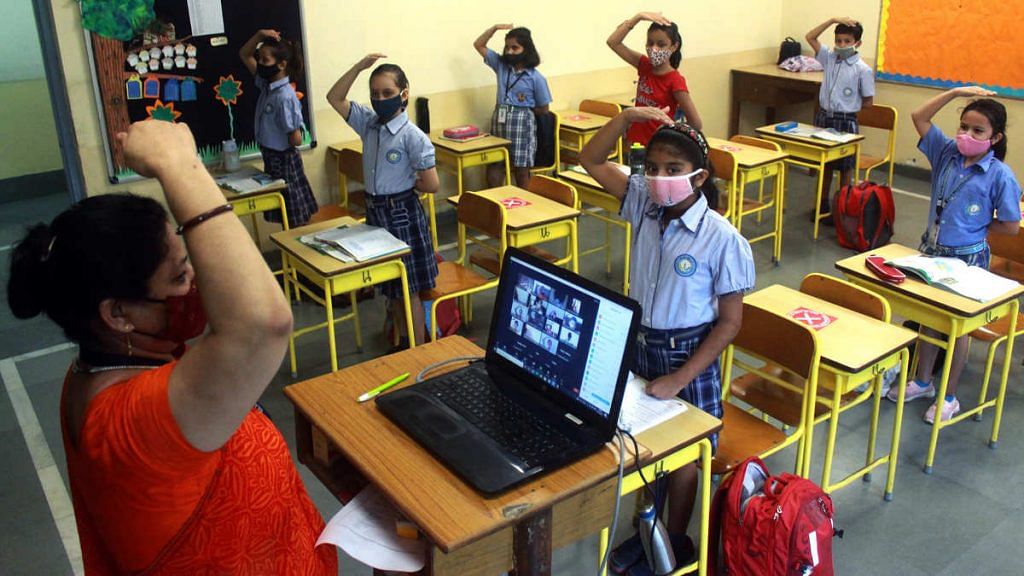New Delhi: Children who have been studying online for almost two years are now back to school in most parts of the country, but their behaviour suggests they are not transitioning well, school authorities, parents and education experts have told ThePrint.
Schools in most parts of the country have reopened in the last two months and children are getting re-integrated into the system. However, in the ‘new normal’, the school too has changed from pre-pandemic times. While most children think “it’s a relief” to be back in school in person instead of interacting with teachers and classmates through a screen, the transition is challenging, according to teachers and school authorities.
Hinting at a similar reality, a UNICEF report released earlier this week found that 14 per cent of young Indians are depressed in Covid times, but are unwilling to talk about it. This is the kind of behaviour that school authorities ThePrint spoke to have also found among students, saying kids are finding the transition difficult. They are not participating in class activities and would rather keep to themselves. They are not their “former selves”, the school authorities said.
Also read: Over 2.9 crore children in India don’t have access to digital devices, govt report reveals
Challenges in return to classrooms
“With everyone being worried about kids going back to school, especially the parents, the children will also come with some fear in their minds preventing them from returning smoothly to what was normal,” said Nirvaan Birla, director of Birla Open Minds Schools, which run in states like Maharashtra, Rajasthan, UP and others.
Birla added that teachers and principals in his schools have noticed children finding it difficult to interact with each other, and this is especially so with younger students.
“Getting children to open up is a challenge by itself without all of the changes the pandemic brought on. This time around, there is going to be a lot of added effort needed to achieve this. Their sleeping and eating patterns as well as the amount they interact with each other has changed, making the usual teaching and learning style a little difficult to maintain,” he said.
Keeping students calm and helping them ease back into the everyday routine is key at this point, Birla added.
Rajesh Bhatia, educationist and founder and CEO of Treehouse Education & Accessories Ltd, which provides preschool education services in Mumbai, told ThePrint that the environment children are now experiencing in schools post-pandemic “is different and we should give them time to adjust and let them be”.
“Children are welcoming coming back to school, it was a leap of freedom for them… They were frustrated being boxed up at home,” Bhatia said.
To welcome children back to schools, one has to understand how things have changed from their perspective, he continued.
“The child has two varieties of pressure — from the parent, that he or she has to be safe, and then there is the whole pressure of being in school. He or she sees a school which is not the same… you have to maintain distance, there is a security officer watching your temperature, you have to keep sanitising yourself. Even for adults, things are not the same anymore, so how do we expect children to feel the same?” Bhatia asked.
Teenage kids refuse to open up
Yogita Joshi, a counsellor at a private school in Delhi, said she agrees with the findings of the UNICEF report. “Getting students, specially the teenage kids, to interact with each other was anyway a difficult task, and now with the pandemic and all the restrictions, they just conveniently avoid each other. It’s not good for them… Their mental health is suffering,” said Joshi.
“After being cooped up at home for more than a year, we were not exactly expecting a smooth transition for the kids, but what is more worrying is that they do not even want to open up about it,” she added.
Mamta Tripathi, who has a teenage daughter attending school in Noida, said she has been facing issues for the past one year. “I cannot get my daughter to participate in any family activity… She is mostly on her phone or laptop. I fear that being cooped up inside the house for such a long time has made her anti-social,” Tripathi said.
“I was hopeful that once she starts going back to school, things will change, but that has also not happened. I am giving her time to deal with things… just like most parents,” she added.
Students from low income families have it worse
Students in government schools were the most affected by school closure as many of them did not have access to devices for attending online classes. However, they are also struggling with the transition back to the classroom. Their challenges are different and in some cases more serious.
Braja Kishore Pradhan, founder of Aahwahan Foundation, a Bengaluru-based not-for-profit organisation working for children’s education, told ThePrint that many children attending government schools are facing financial difficulties as either or both of their parents have lost jobs because of the pandemic.
“After schools reopened, kids were very happy to come to school because online education is not good for underprivileged kids. But with Covid, there are new challenges for students. Those whose parents lost their jobs have to now worry about how their parents will get them meals or stationery or uniforms. This is not something that students would be bothered about earlier,” said Pradhan.
He added that Covid has also led to an increase in the number of girls dropping out of school. “With the schools we work for, we have noticed that many girls have dropped out after schools reopened. Parents who can afford to teach only one child because of financial difficulties are choosing to teach boys over girls,” he added.
(Edited by Paramita Ghosh)
Also read: Week after reopening, Delhi govt schools are buzzing, private classrooms emptier than ever
